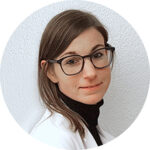-
Tumor from the lab
-
Pancreatic cancer is an aggressive tumor that’s very hard to treat. Oncologist Ralph Fritsch and pathologist Chantal Pauli are seeking new therapies using tumor organoids, lab-grown “copies” of tumors that drugs can be tested on.
-
 “A rare mutation was my rescue.”
“A rare mutation was my rescue.”For 42-year-old Yvonne Senn* the initial diagnosis was devastating: her pancreatic cancer was inoperable because it surrounded vital blood vessels. But she was lucky, because the cells of her tumor exhibited a rare genetic mutation that meant they responded unusually well to certain chemotherapies.
Every year, like Yvonne Senn, around 1,400 people in Switzerland contract pancreatic cancer. The World Health Organization (WHO) estimates that by 2030, pancreatic cancer will have the second-highest mortality rate of any tumor besides lung cancer. So far, only in rare cases has it been possible to effectively treat this aggressive form of cancer, which metastasizes early on.
This means that new therapeutic approaches are enormously important to improve patients’ chances of survival. The research groups headed by Ralph Fritsch at the Department of Medical Oncology and Haematology and Chantal Pauli at the Institute of Pathology and Molecular Pathology at University Hospital Zurich are working on precisely this.
They’re using an approach that is still at the research phase all over the world, but holds great promise: organoids. Organoids are tissue grown in the lab to emulate an organ or, say, a tumor. In the case of cancer patients, a piece of the tumor taken in the course of a tissue sample or operation is used as the starting point. “This enables us to grow a kind of copy of a patient’s individual tumor,” explains Attending Physician Chantal Pauli.
The researchers have built up a database of 50 such organoids of pancreatic tumors at USZ. They now want to use them to find new therapies for cancer patients. The idea is to first test active substances on tumor organoids rather than administering them direct to patients. “This way we hope to be able to find novel treatments without burdening patients,” explains Ralph Fritsch.
They intend to prove the method in their research project and test many different substances. The goal is to pave the way for offering patients with pancreatic cancer personalized treatments in a subsequent trial, all on the basis of tests of their own individual organoids. If it works, this form of precision oncology could at last improve the prospects of effective treatment – allowing more patients like Yvonne Senn to be helped. She responded well to chemotherapy and has been tumor-free for several years.
*anonymized
100% financed

-
-
Project management
-
-

Dr. Ralph Fritsch
Senior Consultant
Department of Medical Oncology and Haematology
University Hoapital Zurich -

Professor Chantal Pauli
Attending Physician
Institute of Pathology and Molecular Pathology
University Hospital Zurich
-
-
Supporting partner
-
-
Iten Kohaut Foundation
